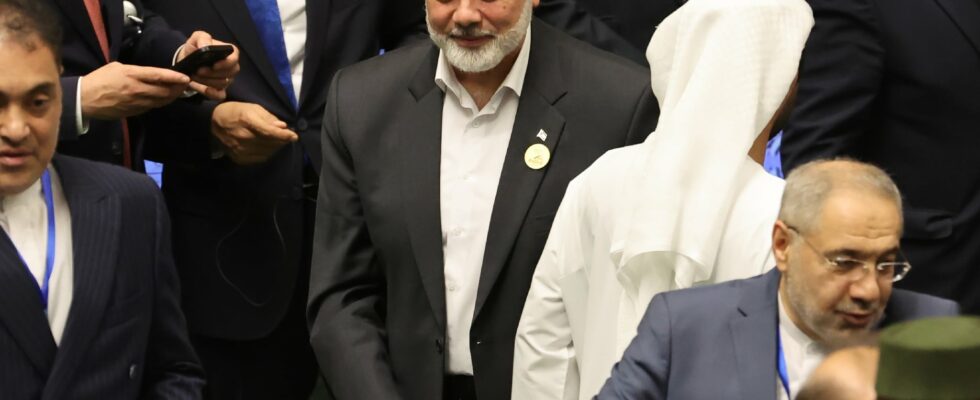On January 3, at the Morasha cemetery in Ramat Hasharon, northeast of Tel Aviv, Israel buried one of its legends, who died the day before at the age of 98. Zvi Zamir headed foreign intelligence, the Mossad, from 1968 to 1974. Based on information from his high-ranking Egyptian source, this spymaster sounded the alarm that led to general mobilization the night before the Egyptian-Syrian Yom Kippur attack on October 6, 1973. This former general also oversaw the famous “Wrath of God” operation: the elimination of members of the Palestinian group Black September, responsible for the murder of Israeli athletes participating in the Munich Olympics in 1972.
The current head of the secret service, David Barnea, used the funeral of his distant predecessor to send a message. “The Mossad, today as it was 50 years ago, is committed to settling accounts with the murderers who swept through Gaza on October 7, as well as with the planners and instigators,” he thundered from a lectern to the right of Zvi Zamir’s coffin. “It will take time, just as it did after the Munich massacre, but we will get our hands on them, wherever they are.” And he warned: “Every Arab mother should know that if her son participated, directly or indirectly, in the carnage […]his blood” will flow.
Noted: on the day that Zvi Zamir passed away, Hamas’ number 2, Saleh al-Arouri, and six other leaders of the movement were killed by a drone strike on their office in the Dahiya neighborhood, in the southern suburbs of Beirut, in the historic stronghold of Hezbollah – al-Arouri was the Hamas leader most closely associated with the Shiite militia and its Iranian sponsor. And almost seven months later, on July 31, Ismail Haniyeh was eliminated, in turn, by an airstrike in Tehran. In voluntary exile for several years and residing most often in Qatar or Turkey, the Hamas leader had attended the inauguration of the new Iranian president, Massoud Pezeshkian, the day before.
A long list of deadly operations
Israel has spectacularly renewed a constant practice of its contemporary existence, that of targeted assassinations. Haniyeh’s assassination follows by a few hours an air strike on the building in Beirut, Lebanon, where Fouad Chokr was located – this was acknowledged by Israel. This senior military official of Hezbollah, a pro-Iranian group close to Hamas, was accused of being responsible for the shooting that killed twelve children a few days earlier on the Syrian part of the Golan Heights, annexed by Israel.
The murder of Ismail Haniyeh is part of a long list of murderous operations carried out on Iranian soil and attributed to Israel. In recent years, several key figures of the regime, military and scientific, have been eliminated or died in troubling circumstances. Among them, Mohsen Fakhrizadeh, one of the directors of the Iranian nuclear weapons program, by a remote-controlled machine gun, a modus operandi as sophisticated as it is unprecedented.
In Get up and kill the first one (Grasset), journalist Ronen Bergman counted more than 2,700 targeted assassinations attributed to Israel since its independence in 1948. “The State of Israel was built on the legacy of the Holocaust and imposed itself on the international scene with the narrative of avenging those who killed Jews, recalls researcher Marie Robin, from the Thucydides Center at Panthéon-Assas University. There is the idea that leaving a massacre like Munich unavenged amounts to leaving the Jewish people as victims of persecution.” An unacceptable principle for the Israeli authorities.
But unlike the assassinations of Black September members, those carried out since October 7 have been carried out by strictly military means. It was also through airstrikes that Israel attempted to eliminate Hamas military leader Mohamed Deif in Gaza on July 13, although no confirmation of his death has been provided. The Israeli authorities also have as a priority the elimination of Yahya Sinouar, the Hamas leader in the enclave.
The impact of these various assassinations remains to be measured. The elimination of certain leaders can reduce Hamas’ operational room for maneuver. But they are often replaced by elements that are sometimes less well-known in the services. “Targeted assassinations are effective at the tactical level, but not at the strategic level,” summarizes Amélie Ferey, a researcher at the French Institute of International Relations. Ismaïl Haniyeh, for his part, played a leading role in the negotiations for the release of Israeli hostages in exchange for an end to the war in Gaza. His death risks further compromising the possibility of a ceasefire, which has so far been elusive.
Before Al-Arouri and Haniyeh, other Hamas figures had been targeted by the Israeli authorities. A helicopter raid killed the founder, Cheick Yassin, as he was leaving a mosque in Gaza in 2004. Six years later, one of its military leaders, Al-Mabhouh, was assassinated in a Dubai hotel room by a Mossad commando identified by surveillance cameras. In 1997, in Amman, Khaled Mechaal, poisoned by Mossad, owed his survival to the antidote provided by Israel, under pressure from the King of Jordan. The massacres of October 7, however, confirm one thing: targeted assassinations have no deterrent effect.
.
